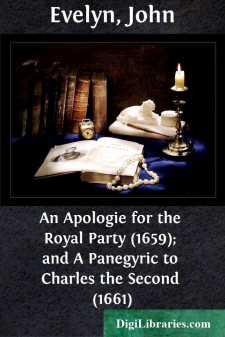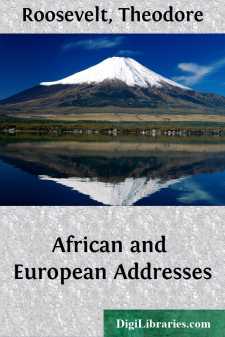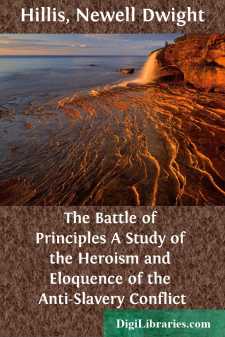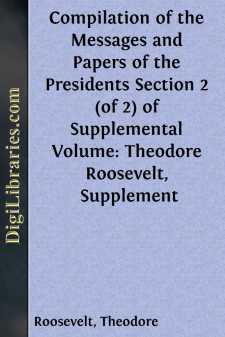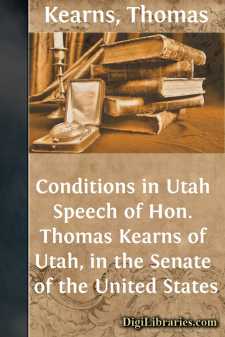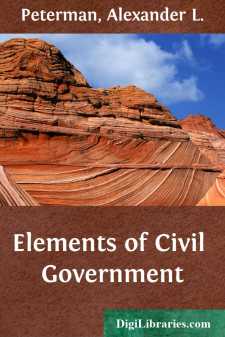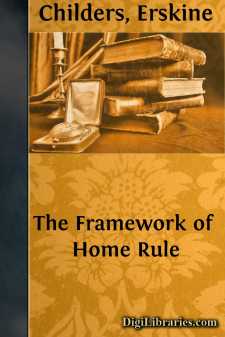Political Science
Political Science Books
Sort by:
by:
John Evelyn
INTRODUCTION On October 24, 1659, a quarto pamphlet was published in London with the following title: “The Army’s Plea for Their present Practice: tendered to the consideration of all ingenuous and impartial men. Printed and published by special command. London, Printed by Henry Hills, Printer to the Army, dwelling in Aldersgate Street next door to the Peacock. 1659”. Three days afterwards, on...
more...
Introduction Mr. Roosevelt as an Orator In the tumult, on the one hand of admiration and praise and on the other of denunciation and criticism, which Mr. Roosevelt's tour in Africa and Europe excited throughout the civilized world, there was one—and I am inclined to think only one—note of common agreement. Friends and foes united in recognizing the surprising versatility of talents and of...
more...
I RISE OF AMERICAN SLAVERY: GROWTH OF THE TRAFFIC The history of the nineteenth century holds some ten wars that disturbed the nations of the earth, but perhaps our Civil War alone can be fully justified at the bar of intellect and conscience. That war was fought, not in the interest of territory or of national honour,—it was fought by the white race for the enfranchisement of the black race, and to...
more...
CHAPTER I NATIONAL CONSCIOUSNESS I An empire the size of Europe setting out on her career of world history is a phenomenon of vast and deep enough import to stir to national consciousness the slumbering spirit of any people. Yet when you come to trace when and where national consciousness awakened, it is like following a river back from the ocean to its mountain springs. From the silt borne down on the...
more...
CHAPTER I. The conquest of South Africa is one of the most curious episodes in English history. Begun through purely mercenary motives, it yet acquired a character of grandeur which, as time went on, divested it of all sordid and unworthy suspicions. South Africa has certainly been the land of adventurers, and many of them found there either fame or disgrace, unheard-of riches or the most abject...
more...
MESSAGE. WHITE HOUSE, December 3, 1901. To the Senate and House of Representatives: The Congress assembles this year under the shadow of a great calamity. On the sixth of September, President McKinley was shot by an anarchist while attending the Pan-American Exposition at Buffalo, and died in that city on the fourteenth of that month. Of the last seven elected Presidents, he is the third who has been...
more...
by:
Thomas Kearns
SPEECH OF HON. THOMAS KEARNS. POLYGAMOUS MARRIAGES AND PLURAL COHABITATION. The PRESIDENT pro tempore. The Chair lays before the Senate the resolution submitted by the Senator from Idaho [Mr. DUBOIS], which will be read. The Secretary read the resolution submitted yesterday by Mr. DUBOIS, as follows: Resolved, That the Committee on the Judiciary be, and it is hereby, authorized and instructed to...
more...
CHAPTER I. INTRODUCTORY.[1]--People living in the United States owe respect and obedience to not less than four different governments; that is, to four forms of organized authority. They have duties, as citizens of a township or civil district, as citizens of a county, as citizens of some one of the States, and as citizens of the United States. All persons are, or have been, members of a family; some...
more...
CHAPTER I GENERAL INTRODUCTION The revolution which broke out in China on the 10th October, 1911, and which was completed with the abdication of the Manchu Dynasty on the 12th February, 1912, though acclaimed as highly successful, was in its practical aspects something very different. With the proclamation of the Republic, the fiction of autocratic rule had truly enough vanished; yet the tradition...
more...
by:
Erskine Childers
INTRODUCTION My purpose in this volume is to advocate a definite scheme of self-government for Ireland. That task necessarily involves an historical as well as a constructive argument. It would be truer, perhaps, to say that the greater part of the constructive case for Home Rule must necessarily be historical. To postulate a vague acceptance of the principle of Home Rule, and to proceed at once to the...
more...


